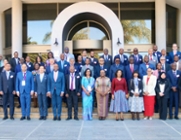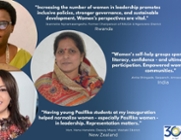On the frontline of women's entrepreneurship
28 May 2021
CLGF warmly welcomed the Commonwealth Entrepreneurs Summit 21 held on 19 and 20 May, as an important step in highlighting and progressing the role of women in local economic development. As well as providing an address at the opening ceremony, Secretary-General, Lucy Slack continued her active involvement by moderating an important session on GEN policy, entitled: Voices from the Frontline - Women Entrepreneurs and Policy.
Untapped potential
Opened by Cristina Fernandez & Arif Zaman, the discussion began with David Halabisky from the OECD setting the scene on the complexity of supporting Women's Entrepreneurship. He highlighted that this was a clear area of untapped potential and that if the gap between men and women in entrepreneurship were closed, global GDP would be increased by about 2%. Currently, only 4 out of 10 women, compared with 6 out of 10 men, feel able to create a business. He explained the clear need for specific support to women entrepreneurship, as women have different motivations to men for opening a business: women stress the importance of flexibility, whereas men think about business success. The barriers faced by women are different, too, such as access to finance, cultural issues around gender roles and the labour market.
Some countries, however, are providing support to female entrepreneurs through training, coaching and mentoring, peer learning; gender mainstreaming in entrepreneurship programmes; increased access to finance; and family policy and tax policy. He stressed that there has been some good experience in implementing small projects for support, as well as in microfinance but, to date, OECD countries are not doing enough to share learning and scale-up good experience. The following areas were recommended as focal points for action:
- Career path support
- Family policy support
- Ecosystem of support to reinforce female entrepreneurship
- New and more focus on post-startup support
Loren Nadres, of the NYC Economic Development Corporation spoke about the programmes the city has in place to support women entrepreneurs; this includes Women NYC and the RMWV minority women owned business enterprise, where the city is looking to leverage its $17billion annual spend into supporting these businesses. She also highlighted the need to expand the understanding of the background of entrepreneurs, who are not just young people in basements, but also people looking to come back into the workforce, people coming out of careers; so a much more diverse ecosystem to support
Cultural barriers
Renata Lauren who is also working to support Women entrepreneurs in Brazil talked about a project that recently supported 10,000 women. Her interventions were focused on the cultural / learned behaviours that create barriers for women entrepreneurs. Hard skills need to be developed, but so too do soft skills. She explained that women grow up in a social culture that pushes them away from entrepreneurial tendencies and roles that require confidence. Mentoring and role models are a key way to overcome this learning.
The next panel brought together a set of speakers from the front line who were asked to speak about the greatest ignored barrier.
Focus on women dominated sectors in recovery
Norene Casareo focused on how our economies are structured by gender, using the Covid-19 crisis as an example. She highlighted how it was sectors that are more dominated by women that faced the most difficulty in the Covid-19 lockdowns (tourism, hospitality, care); but in the economic recovery package it is male dominated sectors that are the focus of support (tech, construction, etc.)
Ngozi Oyewole focused on the need for women to be prepared and supported. She explained they women are more likely to be doubted when presenting their business ideas and must prepare and have confidence. She stressed the usefulness of women coming together to support each other and lobbying together; and now there are women targeted funds available in Lagos.
Accessing finance and space
The last speaker, Archana Bhatnagar, looked at access to finance and markets; and access to space. She described how, in India, many women entrepreneurs are working out of their homes, and therefore have no access to a dedicated business space, or the networking and skills of building of a business area. They also lack the ability to market or sell their products.
Women have been advocating for a government-supported, dedicated, shared safe space which can also provide shared services for marketing, packaging etc., with the possibility to include day care.
Closing the session, Ms Slack explained the role of CLGF's Commonwealth Women in Local Government in empowering women, politically and economically, She said that: "This session has highlighted the complex needs of women entrepreneurs, particularly in light of specific barriers, and the power of mentoring to encourage women to form networks to support each other. It has shown the real power of the collective: recognising and valorising the skills developed and learned locally. It is extremely important to use these lessons to develop enabling policies to support women entrepreneurs"
For more information about this event, go to the website.
Back to News





